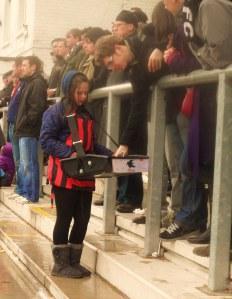In his second article for TBIR on the myth of insolvency, Robert O’Connor examines how football is slowly creating its own black hole to be sucked into.
A new page was turned in the spirit-crunching story of football financial management last summer when the first heavy-weight club from the game’s fatherland admitted, after a lengthy inevitability, that the game was up and went sheepishly to the wall. Rangers left behind them a patchwork of some of modern football’s greediest and most toxic elements, including speculative over-spending, undisguised self-interest and most frighteningly a warped and increasingly ubiquitous blueprint that sees football clubs as tools for the advancement of their owners’ interests, rather than vice versa. More directors should recall Kennedy when assessing their relationships with the respective clubs and ask not what these great institutions can do for them but what they might offer to the scores of fans that invest their trust in them as guardians.

There are those who made it as far as the brink and found a way back – Leeds United for those who have long memories, pre-Abramovich Chelsea for those who have longer – but this triumvirate of the damned represents perfectly the scope of the risk presented by debts that grow and grow and grow and then crunch. To supporters of the professional, non-league and continental games they are a living memorial to the mess left behind when blind ambition woos petty jealousy, mates with small-minded incompetence and elopes in the arms of consummate avarice. The romantic heart bleeds for the fans that lose out as their clubs are wiped from the back pages but as we are reminded by that tired old truism the game is now more than just that; it is a business, vulnerable to the same temperamental forces that break and make fortunes. And those that fall along the way? Football, so much more important than life itself, goes on.
Comparisons between football and the business world are tricky, and commentators who try and moralise about the former by referencing common practice in the latter rarely make a coherent case. We’ve all heard it – managers given a hasty chop are told that the business world wouldn’t tolerate a year of missed targets for its most executive operators (see the vacant manager’s seat at Manchester City for a case in point), whilst some rally round and pine that corporate strategy would never promote such a rapid turn–over of management staff (stroll a mile or two and Alex Ferguson’s exit parade bears reliable witness). But it’s a circular argument, and one that doesn’t really clear up whether or not impatient investors are right or wrong when pulling the chain on bosses who struggle to hit targets. We all – fans, directors, investors – want to see our club succeed, but by what measure do we define success and at what cost are we to pursue it?
I’ll wager a thought: football is both business and it is sport, and by extension it is neither. Before you reach for Spinoza or slip helplessly through the fabric of your metaphysical self, I’ll deconstruct.
The game has only been able to become the financial behemoth that consumes millions of man hours across the media, catering, transport, construction, service, digital and manufacturing industries because it meets the criteria laid down by classic supply and demand economics. There is a product that people are ready and willing to consume in a hundred different ways, pouring in money to encourage that product to reach deeper and deeper into public life. That product is football – a base and primitive spectacle turned into a must have fashion accessory by a ruthlessly aggressive branding campaign carried out over a period of two decades by the Premier League and BskyB. It has been able to exercise cultural dominance over large parts of continents because of the way it looks, the way it feels, the subtle associations it has made between itself and the very concepts of success and of plenty. This is football the brand, where success is derived from how many are watching, buying and subscribing.
But before this there was something else – before the brand there was that base and primitive spectacle and within it there still is. There is organic football. The competitive spirit and tribal factionalism that make all sport attractive to us is still alive and still tears into us, scything through the parts of us that are rational and thoughtful, reducing the thinking man to the most cellular levels of hopelessness and rapture. Before these epitaphs were ever printed on the side of a coke can there was love, there was hate and there was sport, and, if you scratch beneath the surface of that clip-art lion wearing its mustard yellow crown like something out of a Baltic Christmas cracker, it’s still there.
And so football, inevitably, is more than business, just like the purists say, but it is so uniquely. The shiny corporate shell is thick and conspicuous but there is the Corinthian spirit of competitive tribalism rolling around inside like dice, and its impact is chaotic and difficult to predict.
For the clearest picture of the way the football bug churns at the workings of corporate planning like heartburn we can look at once to Glasgow, to Chester and to Florence. Three clubs that went bust, three businesses that became insolvent and ceased to trade. And yet at the end of the 2012/13 season all three names could be found on the league tables of senior, professional organisations. All three still compete and trade at more or less the level they were at when the receivers waved the white flag, called time or pulled the plug on operations at various points over the last decade. Football clubs, it seems, are more than just stubborn. They are indestructible.
What other species of institution can sit so nerve-janglingly close to the precipice, fall, and live to tell the tale? Fiorentina lived hopelessly beyond their means in the early 00’s in a bid to build on a high profile Champions League campaign but within three years the holding company had ceased to trade, saddled with unbearable debts as the team failed to become a major name in Europe. Rangers buckled and collapsed when HMRC demanded the owners pay up on bills racked up under suspect contractual arrangements, and Chester City were wound up in 2010 when the Football Conference kicked them out over an outstanding wage bill. In May the clubs recorded finishes of 4th, 1st and 1st respectively in professional leagues, the latter two achieving significant promotions and the Florence outfit missing out agonisingly on the glamour and riches of the Champions League.
So how is it that three businesses that were dissolved and written off are able to continue competing and achieving? When a football club collapses it leaves behind a number of permanent assets. It leaves players, it often leaves a stadium, it leaves management expertise bound up in high ranking executives (assuming they’ve been allowed to by the authorities to continue working in the game). Most importantly of all it leaves the fans – it leaves a market share to which no competitor can stake a claim. Which is why when Chester were allowed to start all over again at the eighth level of the pyramid they bulldozed their way through three divisions in less time than it takes to sign a winding up order, following in the footsteps of AFC Fiorentina who shot back to Serie A following the original club’s liquidation. Rangers have wasted no time in beginning their ascent from the basement of Scottish football and their dominance of the lower divisions represents a familiar story.
When corporations collapse it tends to be because they are no longer the consumer’s first choice to satisfy demand or because that demand has ceased – but Rangers fans will always be Rangers fans and they will always crave Rangers. As consumers they won’t suddenly begin to invest their disposable income in Parkhead, nor will their interest in the game wane because their team have been forced to play in the lower leagues for a season or two. And so the club’s legacy sustains it and ultimately raises it back to its former glory.
The football snake eats its own tail.
Robert will be found this summer, shaking his head in dispair at the appointment of Joe Kinnear by Newcastle United.

